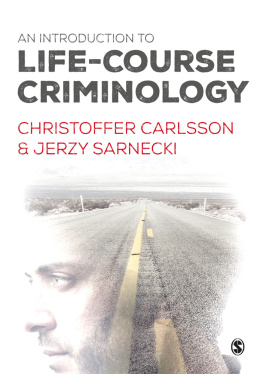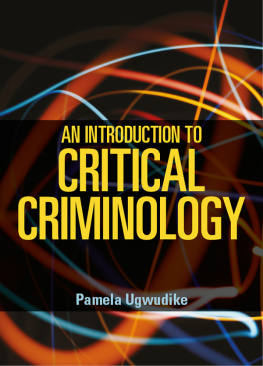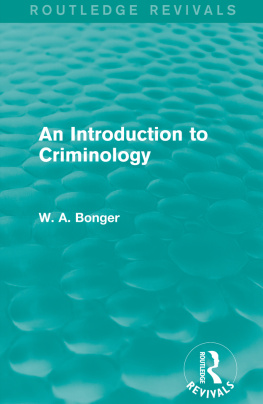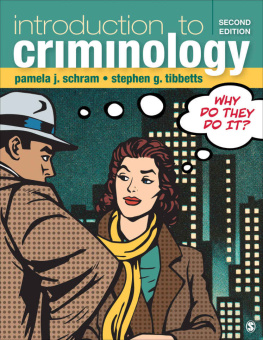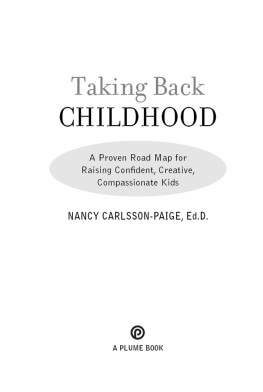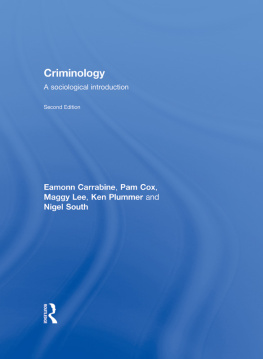An Introduction to Life-Course Criminology
Praise for the book
This is an excellent introduction to a topic of central importance for criminologists. It has the merit of being very clearly written, and the authors cover a wide range of materials theories and data; European and American research; quantitative and qualitative studies. Throughout, they provide helpful examples from their work on the Stockholm Life Course Project. Highly recommended.
Sir Anthony Bottoms, Emeritus Wolfson Professor of Criminology, University of Cambridge
Carlsson and Sarneckis An Introduction to Life-Course Criminology captures the excitement of the life course perspective within criminology, a lens and set of preoccupations that have become increasingly central to the field. This lively and engaging volume will not only give other scholars and students alike a full appreciation of key concepts and historical roots, but open a window on what is at stake theoretically, and how recent research informs contemporary debates. Illustrations from the authors own important longitudinal study are especially useful, as they make tangible sometimes slippery notions (e.g., agency) and complicated pathways (the desistance process). This would be an ideal text for a class on life course criminology and an excellent supplement for more general courses, and will be an outstanding resource for researchers with interests in this area.
Peggy Giordano, Distinguished Professor of Sociology, Bowling Green State University
Written by an emerging scholar in Carlsson and an internationally acclaimed criminologist in Sarnecki, the book is historically rich, theoretically provoking, methodologically sound, and policy relevant. Weaving in their own work with the Stockholm Life Course Project, this book casts a bright light into the futures of life course criminology and deserves to be read.
Alex R. Piquero PhD, Ashbel Smith Professor of Criminology, University of Texas at Dallas
The field of life-course criminology has clearly come of age. Carlsson and Sarneckis important new text is a wise and generative gift for the next generation of life course scholars. The authors clarify and synthesize decades of research on crime and the life course across multiple disciplines, and lay out the challenges still to come. It is a perfect introduction to a fascinating body of work.
Shadd Maruna Dean, Rutgers School of Criminal Justice
An Introduction to Life-Course Criminology
- Christoffer Carlsson
- Jerzy Sarnecki
SAGE Publications Ltd
1 Olivers Yard
55 City Road
London EC1Y 1SP
SAGE Publications Inc.
2455 Teller Road
Thousand Oaks, California 91320
SAGE Publications India Pvt Ltd
B 1/I 1 Mohan Cooperative Industrial Area
Mathura Road
New Delhi 110 044
SAGE Publications Asia-Pacific Pte Ltd
3 Church Street
#10-04 Samsung Hub
Singapore 049483
Christoffer Carlsson and Jerzy Sarnecki 2016
First published 2016
Apart from any fair dealing for the purposes of research or private study, or criticism or review, as permitted under the Copyright, Designs and Patents Act, 1988, this publication may be reproduced, stored or transmitted in any form, or by any means, only with the prior permission in writing of the publishers, or in the case of reprographic reproduction, in accordance with the terms of licences issued by the Copyright Licensing Agency. Enquiries concerning reproduction outside those terms should be sent to the publishers.
Library of Congress Control Number: 2015940124
British Library Cataloguing in Publication data
A catalogue record for this book is available from the British Library
ISBN 978-1-44627-590-0
ISBN 978-1-44627-591-7 (pbk)
Editor: Amy Jarrold
Editorial assistant: George Knowles
Production editor: Sarah Cooke
Copyeditor: Lynda Watson
Proofreader: Katie Forsythe
Indexer: Judith Lavende
Marketing manager: Sally Ransom
Cover design: Francis Kenney
Typeset by: C&M Digitals (P) Ltd, Chennai, India
Printed and bound by CPI Group (UK) Ltd, Croydon, CR0 4YY
List of figures and tables
Figures
Tables
About the authors
Christoffer Carlsson(b. 1986) has a PhD in Criminology from The Department of Criminology at Stockholm University. His main field of work is life-course criminology, where he has published extensively. In 2012, he received the European Society of Criminologys Young Criminologist Award for his work on turning points and desistance processes.Jerzy Sarnecki(b. 1947) came to Sweden from Warsaw, Poland as a refugee in 1969. He has a PhD in Sociology from Stockholm University (1978) and is Professor of Criminology at Stockholm University and University of Gvle. He has done extensive research on youth crime, criminal networks, and criminal policy, and is the author of several textbooks in criminology. Having worked on The Stockholm Life-Course Project since the late 1970s, Sarnecki has been the project director for the 2nd and 3rd waves of the study. He is also co-chair of the jury for the prestigious Stockholm Prize in Criminology.
Acknowledgements
The authors wish to thank the Swedish National Banks Jubilee Fund, the Swedish Prison and Probation Service, the Swedish National Board of Institutional Care, and the Department of Criminology at Stockholm University, for financing of The Stockholm Life-Course Project, which forms much of the basis of this book. We are also very grateful for the great encouragement and assistance we have received from Natalie Aguilera, Amy Jarrold, Sarah Cooke and George Knowles at SAGE Publications during our work.
We also want to pay our respect to the first generation of scholars who launched and worked on The Stockholm Life-Course Project, and without whose enormous efforts this work would not have been possible. These include Gsta Carlsson, Birgitta Olofsson, Gustav Jonson, Anna-Lisa Klvesten, Sven Ahnsj, Kerstin Elmhorn, Kristine Humble, and Gitte Settergren Carlsson.
Finally, to our colleagues at the Department of Criminology at Stockholm University, and to our respective friends and families: thank you.
Life-Course Criminology: An Introduction
In November 2010 Francis T. Cullen, a well-known criminologist and the then recipient of the prestigious Edwin Sutherland Award, delivered his Sutherland Address during the annual American Society of Criminology (ASC) meeting in San Francisco. In this address, he noted that life-course criminology is now criminology (Cullen, 2011: 310). Cullens intention was not, we think, to argue that all criminological inquiries are or should be informed by a life-course perspective (although an increasing number are). Rather, it was to suggest that life-course criminology is now an integral part of criminology as a whole. Indeed, although the main ideas of the field are as old as criminology itself (probably older), it did rise to fame very quickly.





